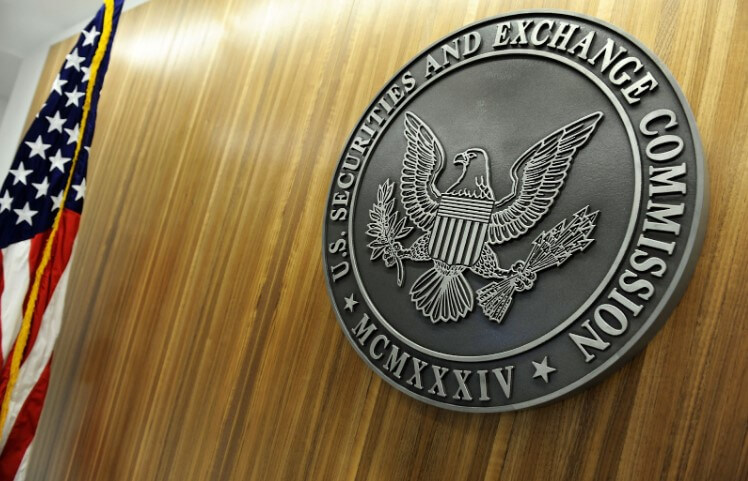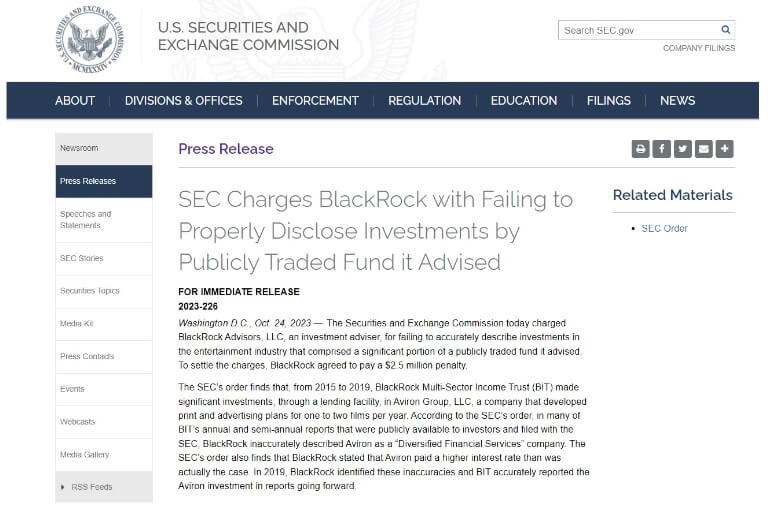
In a significant development that has sent ripples through the financial world, the US Securities and Exchange Commission (SEC) has charged BlackRock Advisors, LLC, a prominent investment adviser, for a failure that strikes at the core of investor transparency. BlackRock is accused of inadequately disclosing investments in the entertainment industry, constituting a substantial portion of a publicly traded fund, it advised. The fallout? A $2.5 million penalty…
The SEC’s Allegations

The SEC’s charges against BlackRock revolve around a crucial period from 2015 to 2019. During this time, BlackRock Multi-Sector Income Trust (BIT), the publicly traded fund, made significant investments via a lending facility. These investments were directed toward Aviron Group, LLC, a company primarily developing print and advertising plans for one to two films annually.
The heart of the issue lies in the description provided by BlackRock in the fund’s annual and semi-annual reports, publicly available to investors and filed with the SEC. According to the SEC’s allegations, BlackRock inaccurately portrayed Aviron as a “Diversified Financial Services” company. The discrepancy between the actual nature of Aviron’s operations and BlackRock’s description is at the crux of the charges.
Moreover, the SEC contends that BlackRock wrongly stated that Aviron paid a higher interest rate than what was reflected in reality. These inaccuracies persisted until 2019, when BlackRock itself recognized and rectified them. Subsequent reports from BIT accurately reflected the Aviron investment.
Table of Contents,
The Regulatory Consequences
In response to the SEC’s charges, BlackRock opted for a settlement. By consenting to the SEC’s order, BlackRock acknowledges violating two key regulatory acts: the Investment Advisers Act (1940) and the Investment Company Act (1940). This conciliation reflects the gravity of the situation and BlackRock’s willingness to rectify the alleged shortcomings.
While BlackRock does not explicitly admit to the SEC’s findings, it has chosen to cease its activities that led to these charges and accept a censure. However, the most visible aspect of this settlement is the $2.5 million penalty, underlining the SEC’s commitment to upholding transparency and the accuracy of information provided to investors.
The Broader Implications
The charges against BlackRock reverberate beyond the specific case. They are a stark reminder of the vital importance of transparent and accurate disclosure in the investment world. Investors depend on the information advisers and fund managers provide to make informed decisions.
The role of the SEC in this context is pivotal. It functions as a watchdog, safeguarding the interests of investors and ensuring that the financial ecosystem operates with fairness, accountability, and transparency. By holding BlackRock accountable for the alleged discrepancies, the SEC reinforces the standards that all investment advisers and fund managers must adhere to.
You can also discover: JPMorgan Predicts Spot Bitcoin ETF Approvals
Conclusion: A Lesson in Transparency
BlackRock’s settlement with the SEC underscores the enduring significance of transparency and truthfulness in the financial industry. While this case centers on a specific incident, its implications reverberate through the investment world. The role of the SEC as a guardian of investor interests is affirmed, and the message is clear: adherence to regulatory requirements and disclosure accuracy are non-negotiable in finance. Investors can take solace in the fact that regulatory bodies are vigilant in upholding the market’s integrity and ensuring that they receive accurate and trustworthy information on which to base their investment decisions.



